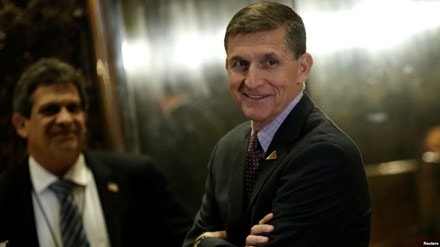Trump under pressure to investigate and fire national security adviser
Democrats in Congress are calling for an investigation into whether new National Security Adviser Mike Flynn discussed US sanctions with Russia before the Trump administration took office.
 |
| National Security Advisor Mike Flynn. |
Two major US newspapers, The Washington Post and The New York Times, reported yesterday that Mr. Flynn discussed sanctions that the Obama administration had imposed on Russia, despite the Trump administration's denial that sanctions were not the subject of those contacts.
Speaking to reporters on the presidential plane on Friday, Mr Trump said he was unaware of reports that Mr Flynn had discussed sanctions against Moscow with Russia. Mr Trump said he would look into the matter, but later said he had 'total confidence' in Mr Flynn.
Many Republican lawmakers demanded an investigation into Mr. Flynn, while many others urged President Trump to fire Mr. Flynn and ask US intelligence to review Mr. Flynn for security reasons.
Nine anonymous people described as former and current US officials told the Washington Post that Mr Flynn and Russian Ambassador Sergey Kislyak apparently discussed sanctions that the Obama administration imposed on Russia following the hacking scandal.
The phone calls between Mr. Flynn and Russia took place at the same time the Obama administration was promoting sanctions against the country, causing US intelligence officials to be suspicious and conduct investigations.
Mr. Flynn denied this to the Washington Post, asserting that he did not discuss sanctions with Mr. Kislyak, but on Thursday he retracted that statement and, through a spokesman, told the Washington Post that “while he did not recall discussing sanctions, he was not absolutely certain the subject was not raised.”
In an interview with CBS last month, US Vice President Mike Pence also denied that the conversation took place. Mr. Pence said the news was one of the “bizarre rumors surrounding the Trump campaign.”
The comments contrast with a Washington Post report about the conversation, one of several contacts between Flynn and Kislyak that began before the November 8, 2016, presidential election and continued throughout the transition, according to the newspaper.
Information about this dialogue comes from information gathered by intelligence officials while monitoring the communications of Russian diplomats.
According to the New York Times, officials have in their possession unclassified transcripts of the phone calls between Mr. Flynn and the Russian ambassador, Mr. Kislyak. Officials who have access to these documents later disclosed details to the two newspapers.
They told the Washington Post that the conversation could violate the Logan Act, a US law that prohibits citizens from negotiating with foreign governments without permission.
The Logan Act outlaws a U.S. citizen from contacting any foreign government “with the intent to influence the measures or conduct” of that government “in connection with any dispute or controversy with the United States.”
Officials say it is unlikely, however, that a full legal case can be built against Mr. Flynn, because no one has been prosecuted under the law.
According to Labor

